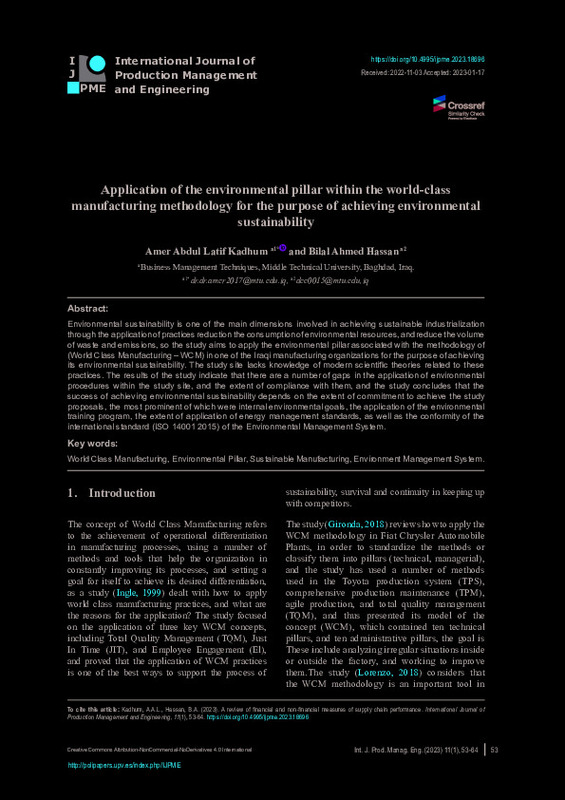Abubakr, M., Abbas, A.T., Tomaz, I., Soliman, M.S., Luqman, M., & Hegab, H. (2020). Sustainable and Smart Manufacturing: An Integrated Approach, Sustainability, Sustainability, 12(6), 2280. https://doi.org/10.3390/su12062280
Black, J. (2008), Lean Production: Implementing a World - Class System, First Edition, Industrial Press, Inc, New York,1-16. https://books.google.iq/books/about/Lean_Production.html?id=8k1hXlvWx7kC&redir_esc=y
Carley, S., Jasinowski, J., Glassley, G., Strahan, P., Attari, S., & Shackelford, S. (2014). Success Paths to Sustainable Manufacturing, School of Public and Environmental Affairs, Indiana University, https://oneill.indiana.edu/doc/research/sustainability-2014.pdf
[+]
Abubakr, M., Abbas, A.T., Tomaz, I., Soliman, M.S., Luqman, M., & Hegab, H. (2020). Sustainable and Smart Manufacturing: An Integrated Approach, Sustainability, Sustainability, 12(6), 2280. https://doi.org/10.3390/su12062280
Black, J. (2008), Lean Production: Implementing a World - Class System, First Edition, Industrial Press, Inc, New York,1-16. https://books.google.iq/books/about/Lean_Production.html?id=8k1hXlvWx7kC&redir_esc=y
Carley, S., Jasinowski, J., Glassley, G., Strahan, P., Attari, S., & Shackelford, S. (2014). Success Paths to Sustainable Manufacturing, School of Public and Environmental Affairs, Indiana University, https://oneill.indiana.edu/doc/research/sustainability-2014.pdf
Dawai, J.M. (2010). Using the Checklist to Determine the Size of the Gap in Health Services - An Applied Study in the Baghdad Health Department - Al-Karkh, Journal of the University College of Economic Sciences, 23, 169. https://www.esraa.edu.iq/modules/research/res/3035-53233.pdf
De Felice, F., Monfreda, S., Petrillo, A., Nenni, M.E., lannone, R., Introna, V., Giuiusa, A., & De Carlo, F. (2013), Operations Management, licensee InTech, https://www.opentextbooks.org.hk/zh-hant/system/files/export/18/18769/pdf/Operations_Management_18769.pdf
Gimenez, C., Sierra, V., & Rodon, J. (2012). Sustainable operations: their impact on the triple bottom line, International Journal of Production Economics, 140(1), 150. https://doi.org/10.1016/j.ijpe.2012.01.035
Gironda, L. (2018). Application Of WCM Methodologies For First Time Quality Improvement, College Of Engineering Department Of Mechanical And Aerospace Engineering Master Of Science In Automotive Engineering, Poltecnico Di Torino. https://webthesis.biblio.polito.it/7079/1/tesi.pdf
Ingle, S. (1999). World Class Manufacturing: Implementation and Measurement in the Irish Automotive Rubber Mouldings Component Industry, Dublin City University Business School, Dublin City University, is submitted in candidature for the award of Doctor of Philosophy. https://doras.dcu.ie/18864/1/Sarah_Ingle_20130520131022
Kishawy, H.A., Hegab, H., & Saad, E. (2018). Design for Sustainable Manufacturing: Approach, Implementation, and Assessment, Machining Research Laboratory, University of Ontario Institute of Technology, Oshawa, Sustainability, 10(10), 3604., https://doi.org/10.3390/su10103604
Krishnan, A. (2016). Evaluation of Operational Models for World-Class Manufacturing in the Indian automotive components industry, Submitted to the Mit Sloan school of management in partial fulfillment of the requirements for the degree of master of science in management studies, At the massachusetts institute of technology. https://dspace.mit.edu/handle/1721.1/104520
Lorenzo, C. (2018). AWCM methodology application: the digitalization of the Upstream Check and its organiztional impact on the line quality control system, Master thesis - Degree in Ingegneria Gestionale, Polytechnic of Turin. https://webthesis.biblio.polito.it/7341/1/tesi.pdf
Łyp-Wrońska, K.. (2016). World Class Manufacturing methodology as an example of problems solution in Quality Management System, Key Engineering Materials, 682, 342- 349. https://doi.org/10.4028/www.scientific.net/KEM.682.342
Makedonskiy, P., & Belyaeva, Zh. (2016). Adaptation of the concept of world class manufacturing (WCM) in divisions of multinational corporation on the example of LLC unilever rus kalian, Graduate School of Economics and Management, Ural Federal University, Smart business models in the world economy. http://hdl.handle.net/10995/68081
Malindzakova, M., & Malindzak, D. (2020). Linking the World Class Manufacturing System Approach with a Waste Management, TEM Journal, 9(2), 750-755. https://doi.org/10.18421/TEM92-43
Mendes, R.C., & Mattos, M.C. (2017). Knowledge Management and World Class Manufacturing: an initial approach based on a literature review, Perspectives in Information Science, 22(2), 244-263. https://doi.org/10.1590/1981-5344/3103
Midor, K. (2012). World Class Manufacturing - characteristcs and implementation in an automotive enterprise, Scientific Journals, Maritime University of Szczecin, 32(104), 42-47. https://bibliotekanauki.pl/articles/359101.pdf
Moldan, B., Janousková, S., & Hák, T. (2012). How to understand and measure environmental sustainability: Indicators and targets. Ecological Indicators, 17, 4-13. https://doi.org/10.1016/j.ecolind.2011.04.033
Moreli, J. (2011). Environmental Sustainability: A Definition for Environmental Professionals, Journal of Environmental Sustainability, 1(1), 1-9. https://doi.org/10.14448/jes.01.0002
Muller, F., Cannata, A., Stahl, B., Taisch, M., Thiede, S., & Herrmann, C. (2013). Green Factory Planning - Framework and modules for a flexible approach, In: Prabhu, V., Taisch, M., Kiritsis, D. (eds) Advances in Production Management Systems. Sustainable Production and Service Supply Chains. APMS 2013. IFIP Advances in Information and Communication Technology, vol 414. Springer, Berlin, Heidelberg. https://doi.org/10.1007/978-3-642-41266-0_21
Pathak, P., Singh, M.P., & Sharma, DR. Pankaj, (2017). Sustainable Manufacturing: An Innovation and Need For Future, Research Scholar, Mechanical Engineering Department, Jagannath University, Proceedings of International Conference on Recent Innovations in Engineering and Technology, Jaipur, India, https://www.researchgate.net/publication/317030927_sustainable_manufacturing_an_innovation_and_need_for_future
Pela, F. (2015). World Class Manufacturing Analysis. The FCA case, Faculty of Economics, Master's Degree Course in Economics and Business Management, Free Intlrnational University in Social Studies, Italya, https://doi.org/10.1080/00207543.2014.958596
Robinson J. (2004). Squaring the circle? Some thoughts on the idea of sustainable development, Ecol Econ, 4(48), 370. https://doi.org/10.1016/j.ecolecon.2003.10.017
Salvadora, R., Piekarski, C.M., & de Francisco, A.C. (2017). Approach of the Two-way Influence Between Lean and Green Manufacturing and its Connection to Related Organisational Areas, International Journal of Production Management and Engineering, 5(2), 73-83. https://doi.org/10.4995/ijpme.2017.7013
Sari, E.B. (2018). World Class Manufacturing (WCM) Model and Operational Performance Indicators: Comparison Between WCM Firms, Journal of the Faculty of Business, 19(2), 249-269. https://dergipark.org.tr/tr/download/articlefile/618812 https://doi.org/10.24889/ifede.404806
Sartal, A., Bellas, R., Mejias, A.M., & Garcia, A. (2020). The sustainable manufacturing concept, evolution and opportunities within Industry 4.0: A literature review, Advances in Mechanical Engineering, Sage, pp: 6. https://doi.org/10.1177/1687814020925232
Sekar, N. (2017). A study on Environment Sustainability by Satisfying Rural requirements in Agriculture and food processing via Urban solid waste treatment, Conference: International Conference on Innovative trends in Business Practices for Sustainable Deveopment, ResearchGate, https://www.researchgate.net/publication/320908129_environmentsustainability-2016 Singh, M., Ohji, T., Asthana, R. (2016). Green and Sustainable Manufacturing of Advanced Materials, Elsevier Inc, pp: 3-10. https://doi.org/10.1016/B978-0-12-411497-5.00001-1
Svensson, A.B.A. (2011). Critical equipment classification and cost reduction within professional maintenance, Master of Science Thesis in Production Engineering, Department of Product and Production Development, Division of Production Systems, Chalmers University of Technology, Göteborg, Sweden. https://publications.lib.chalmers.se/records/fulltext/142419.pdf
[-]









